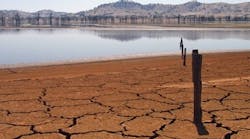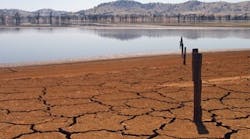Water scarcity now affecting four billion people, claims new study
TWENTE, The Netherlands - There are four billion people worldwide who are affected by severe water scarcity for at least one month a year.
That is the conclusion of Arjen Hoekstra, professor of water management at the University of Twente, in new research published in Science Advances.
Professor Hoekstra’s team is the first research group in the world to identify people’s water footprint from month to month and to compare it to the monthly availability of water.
“Up to now, this type of research concentrated solely on the scarcity of water on an annual basis, and had only been carried out in the largest river basins,” said Hoekstra.
He defined severe water scarcity as the depletion of water in a certain area.
He said: “Groundwater levels are falling, lakes are drying up, less water is flowing in rivers, and water supplies for industry and farmers are threatened. In this research, we established the maximum sustainable ‘water footprint’ for every location on earth, and then looked at actual water consumption. If the latter is much greater than what is sustainable, then there can be said to be severe water scarcity.”
Until now, it had always been assumed in the scientific community that two to three billion people were affected by severe water scarcity.
“Previous research looked at the availability of water on an annual basis, but that paints a more rosy and misleading picture, because water scarcity occurs during the dry period of the year,” explained Hoekstra.
In his research, he describes for each place the number of months in a year that people are affected by severe water scarcity. That varies from zero to twelve months per year.
Of the four billion people referred to, a large proportion feel the effects of water scarcity directly.
Particularly in Mexico, the western US, northern and southern Africa, southern Europe, the Middle East, India, China, and Australia, households, industries and farmers regularly experience water shortages. In other areas, water supplies are still fine but at risk in the long-term.
Hoekstra said the figures were “alarming” and notes that the subject of water scarcity is climbing higher and higher on the global agenda.
“The fact that the scarcity of water is being regarded as a global problem is confirmed by our research. For some time now, the World Economic Forum has placed the world water crisis in the top three of global problems, alongside climate change and terrorism.”
Professor Hoekstra added: “All over the world, it is clear that the risks associated with high water consumption are being increasingly recognised. The growing world population, changes in consumer behaviour, and climate change are having a significant impact on the scarcity and quality of water.”
Last year, Professor Hoekstra drew up a ranking list of the transparency of the 75 largest Dutch stock-listed companies regarding their direct and indirect water consumption (read article).
###
Read more

